最新英语同义近义词短语讲课教案
初中英语同义词和近义词教案
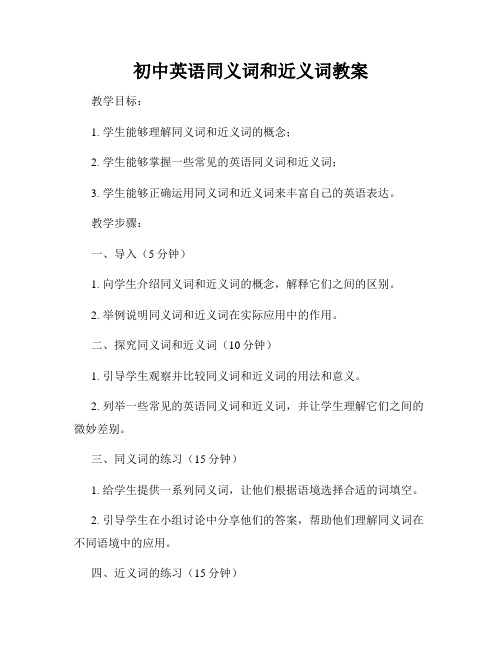
初中英语同义词和近义词教案教学目标:1. 学生能够理解同义词和近义词的概念;2. 学生能够掌握一些常见的英语同义词和近义词;3. 学生能够正确运用同义词和近义词来丰富自己的英语表达。
教学步骤:一、导入(5分钟)1. 向学生介绍同义词和近义词的概念,解释它们之间的区别。
2. 举例说明同义词和近义词在实际应用中的作用。
二、探究同义词和近义词(10分钟)1. 引导学生观察并比较同义词和近义词的用法和意义。
2. 列举一些常见的英语同义词和近义词,并让学生理解它们之间的微妙差别。
三、同义词的练习(15分钟)1. 给学生提供一系列同义词,让他们根据语境选择合适的词填空。
2. 引导学生在小组讨论中分享他们的答案,帮助他们理解同义词在不同语境中的应用。
四、近义词的练习(15分钟)1. 给学生提供一系列近义词,让他们根据语境选择合适的词填空。
2. 让学生交流并解释他们选择的理由,加深对近义词之间微妙差别的理解。
五、同义词和近义词的编写与应用(15分钟)1. 让学生分成小组,每个小组给出一个具体的主题词,然后编写与该主题相关的同义词和近义词列表。
2. 让小组展示他们编写的同义词和近义词列表,并让其他小组进行观察和评价。
六、拓展应用(15分钟)1. 让学生选择一个自己喜欢的英语课文或文段,尝试用同义词和近义词重新表达其中的内容。
2. 让学生分享他们修改后的文段,并对比原文,讨论使用同义词和近义词带来的不同效果。
七、总结与反思(5分钟)1. 对本节课的学习进行总结,回顾同义词和近义词的重要性和应用方法。
2. 让学生回答一些问题,帮助他们思考和反思这堂课的学习收获和不足之处。
八、作业布置(5分钟)1. 布置作业,要求学生找出一篇英语文章,标注其中的同义词和近义词,并写出它们之间的微妙差别。
2. 提醒学生按时完成作业,并在下节课上交。
以上就是本次教案的内容,希望能够帮助到您。
祝您教学顺利!。
《高二英语同义词》课件

同义词介绍
同义词的定义
同义词是指具有相同或相似意义的词语。
同义词的分类
同义词可以分为完全同义词、近义词和辨析义词。
同义词的作用
使用同义词可以丰富语言表达,避免重复,增加语言的灵活性。
常见同义词集锦
聪明 vs 智慧
聪明强调智力高,智慧强调智慧力高,两者有时可 以互换。
美丽 vs 漂亮
美丽形容事物的外在美,漂亮更多指人的外貌。
同义词的使用要考虑上下文和 意义的匹配。
多多练习,掌握同义 词的正确用法
通过练习,加深对同义词的理 解和运用。
《高二英语同义词》PPT课件
# 高二英语同义词 PPT课件 ## 第一部分:同义词介绍 - 同义词的定义 - 同义词的分类 - 同义词的作用 ## 第二部分:常见同义词集锦 - 聪明 vs 智慧 - 美丽 vs 漂亮 - 无聊 vs 冷淡 - 愤怒 vs 激动 - 真实 vs 真正 - 热心 vs 热情 - 参加 vs 加入 ## 第三部分:同义词练习 - 翻译句子中的同义词 - 替换原句中的单词
无聊 vs 冷淡
无聊表示感到无趣,冷淡Байду номын сангаас示冷漠无感情。
愤怒 vs 激动
愤怒强调内心的怒火,激动强调内心的激动和兴奋。
同义词练习
1
翻译句子中的同义词
将句子中的词语用与其意义相近的同义词进行翻译。
2
替换原句中的单词
用同义词替换原句中的某个单词,使句子保持意义不变。
3
选出与原句意义相近的同义词
从给定的选项中选择与原句意义相近的同义词。
同义词的注意事项
1 同义词的使用要点
要根据语境和表达的需求选择合适的同义词。
2 避免使用过多同义词
2024届高考英语复习:同义词的积累课件

5.Determined adj.坚决的,坚定的 Eg:He was determined to rise to the challenge. 他决心克服困难迎接挑战。
6.Unfaltering adj.坚定的,稳定的 Eg:My convictions are unfaltering. l remain true to the ideals I have expressed. 我的信仰不会动摇,我会一直忠于我之前表达过的理想。
1.Accomplish v.完成,实现 Eg:lf we'd all work together, I think we could accomplish our goal. 如果我们齐心协力,我想我们能实现我们的目标。
plete v.完成,结束 Eg:You're allowed an h们有一个小时的时间来完成这次测验。
5.Presume v.料想,认为,设想 Eg:I presume that's not what people meant either. 我假设这也不是人们要说的意思。
6.Guess v.猜测,认为 Eg:We can only guess what happened. 我们只能猜测发生了什么事。
3.Gain v.获得,赢得 Eg:l was able to gain invaluable experience over that year. 在那一年里我获得了十分宝贵的经验。
4. Earn v.赚得,获得 Eg:lt's about time you got a job to earn your keep. 你该找个工作挣自己的生活费了。
5.Disseminate v.散布,传播 Eg:Colleges and universities are not only the important bases to train high quality talents but also the important places to inherit and disseminate the advanced culture. 高校既是培养高素质专门人才的重要基地,又是继承传播先进文化 的重要场所。 municate v.传播,传达,传递 Eg:They successfully communicate their knowledge to others. 他 们成功地把他们的知识传达给别人。
初中英语近义词辨析教案

初中英语近义词辨析教案一、教学目标通过本节课的教学,学生将能够:1. 理解近义词辨析的概念;2. 辨别常见的英语近义词的不同之处;3. 运用所学的知识,准确使用近义词。
二、教学重点1. 同学们能够准确理解近义词的含义;2. 能够分辨并正确运用不同的英语近义词。
三、教学难点1. 帮助学生理解近义词辨析的概念;2. 引导学生准确运用近义词进行语言表达。
四、教学准备1. PowerPoint演示文稿;2. 板书工具;3. 学生的教科书和笔记。
五、教学过程Step 1:导入新知(教师用PowerPoint演示近义词辨析的概念和重要性,并展示一些具体的例子)教师:同学们好!今天我们要学习一种非常重要的英语语言技巧——近义词辨析。
首先,我想问一下,你们知道近义词是什么吗?(等待学生回答)对,近义词就是在意思上相近或相似的词语。
这对我们准确表达自己的想法非常重要,因为有时候仅仅使用一个词可能无法完全传达我们的意思。
下面,我将用几个例子来向你们展示这一点。
(教师使用PowerPoint演示,比较不同近义词的用法,例如:big 和large,happy和glad,buy和purchase等)Step 2:近义词辨析的学习和练习(教师使用PowerPoint展示具体的近义词辨析,以及加以解释和例句)教师:现在,我们将学习一些常见的英语近义词以及它们之间的不同之处。
请仔细观察以下表格。
(教师出示样例表格,如下所示)---------------------------------------| 词语A | 词语B |---------------------------------------| ExampleA | ExampleB |---------------------------------------教师:我将使用这个表格来说明两个不同的近义词,例如:“nice”和“kind”。
请听我解释它们之间的异同,并在表格中填写相关的信息。
(九年级英语教案)中考英语同义词全接触
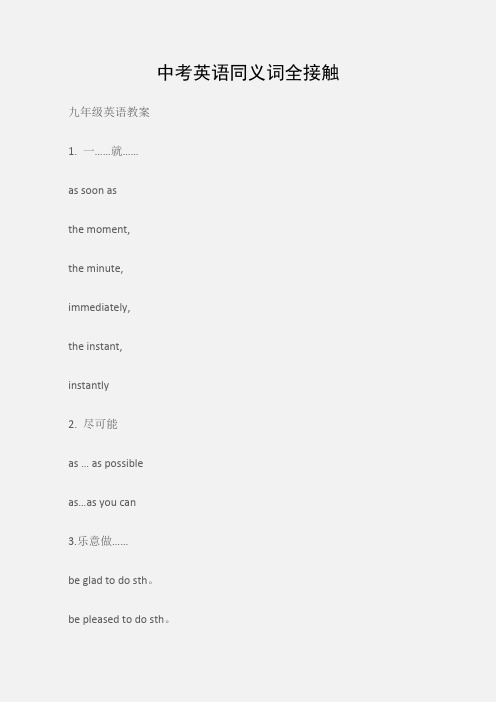
中考英语同义词全接触九年级英语教案1. 一……就……as soon asthe moment,the minute,immediately,the instant,instantly2. 尽可能as … as possibleas…as you can3.乐意做……be glad to do sth。
be pleased to do sth。
be happy to do sth。
be delighted to do sth。
have pleasure to do sth。
4.准备做……get ready for sth。
get sth. readybe ready for sth。
be ready to do sth。
prepare for sth。
prepare oneself for sth。
prepare to do sth。
prepare sth. for sb。
be prepared for sth。
5. “邀请”与“请求”Would you like to do sth.?Would you like sth.?Would you please do…?(回答:I’d love to 。
)6.“没用”It is no use (in)doing sth。
There is no use doing sth。
It is useless to do sth。
It is no good (in) doing sth。
7. “结果”so …that…enough to do sth。
too … to…8. “花费”sb. spends some time/money on sthsb. spends some time/money (in) doing sth。
sb. pays some money for sth。
sb. buy sth. for some money。
(sb sells sth. for some money。
初中英语近义短语替换教案
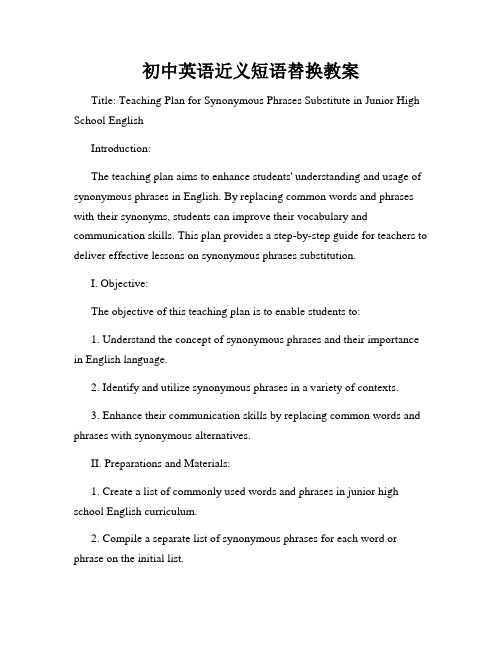
初中英语近义短语替换教案Title: Teaching Plan for Synonymous Phrases Substitute in Junior High School EnglishIntroduction:The teaching plan aims to enhance students' understanding and usage of synonymous phrases in English. By replacing common words and phrases with their synonyms, students can improve their vocabulary and communication skills. This plan provides a step-by-step guide for teachers to deliver effective lessons on synonymous phrases substitution.I. Objective:The objective of this teaching plan is to enable students to:1. Understand the concept of synonymous phrases and their importance in English language.2. Identify and utilize synonymous phrases in a variety of contexts.3. Enhance their communication skills by replacing common words and phrases with synonymous alternatives.II. Preparations and Materials:1. Create a list of commonly used words and phrases in junior high school English curriculum.2. Compile a separate list of synonymous phrases for each word or phrase on the initial list.3. Prepare worksheets or handouts with exercises for students to practice substituting words and phrases with synonymous alternatives.4. Prepare a PowerPoint presentation or other visual aids to assist in the lesson delivery.III. Lesson Plan:1. Warm-up Activity (10 minutes):- Engage students in a short discussion about the importance of vocabulary in communication.- Present a couple of sentences with synonyms highlighted and ask students to identify the synonymous phrases.2. Introduction to Synonymous Phrases (15 minutes):- Define synonymous phrases and provide relevant examples.- Explain the significance of using synonymous phrases to enhance language skills and avoid repetition.- Show examples of how synonymous phrases can replace commonly used words and phrases.3. Group Activity: Synonymous Swap (20 minutes):- Divide students into groups of three or four.- Distribute the list of commonly used words and phrases, along with the corresponding list of synonymous phrases.- Instruct students to work together to replace as many words and phrases as possible with synonymous alternatives.- Encourage students to discuss their choices and potential meanings of the synonymous phrases.4. Whole-class Discussion (15 minutes):- Invite each group to share their substituted phrases and discuss their choices.- Facilitate a class discussion on the advantages and challenges of using synonymous phrases.- Address any misconceptions and reinforce the importance of context when using synonymous phrases.5. Individual Practice (10 minutes):- Provide individual worksheets or handouts with exercises to help students further practice using synonymous phrases.- Encourage students to work independently, substituting words and phrases with appropriate synonymous alternatives.6. Review and Feedback (10 minutes):- Collect and review students' completed worksheets or handouts.- Provide constructive feedback to each student, highlighting areas for improvement and commendation.- Answer any questions or clarify doubts raised by students.IV. Application and Extension Activities:1. Homework Assignment:- Assign students to write a short essay or paragraph using a given set of synonymous phrases.- Encourage them to use synonymous phrases appropriately and effectively in their writing.2. Vocabulary Game:- Arrange a vocabulary game where students have to form sentences using synonymous phrases within a specified time limit.- This activity will help reinforce the usage of synonymous phrases in a fun and interactive way.Conclusion:The teaching plan outlined above provides a comprehensive guide for teaching synonymous phrases substitution in junior high school English. By implementing this plan, students will enhance their vocabulary, communication skills, and overall language proficiency. Through practice and application, students will gradually become more adept at replacing common words and phrases with synonymous alternatives, leading to more precise and varied language usage.。
最新初中英语同义词(近义词)归纳知识讲解
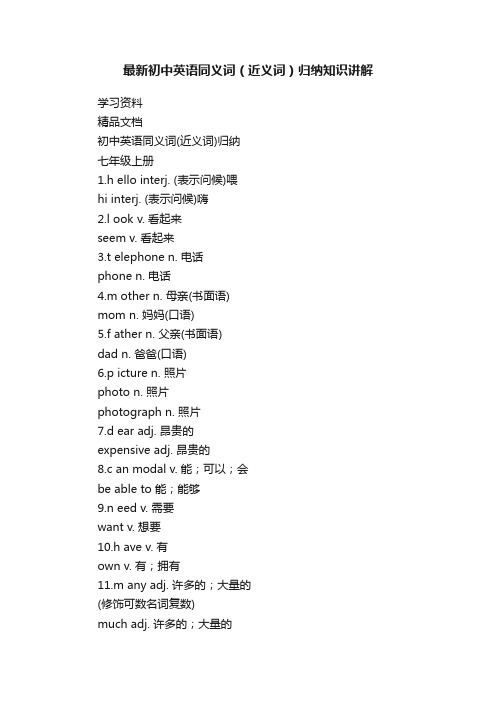
最新初中英语同义词(近义词)归纳知识讲解学习资料精品文档初中英语同义词(近义词)归纳七年级上册1.h ello interj. (表示问候)喂hi interj. (表示问候)嗨2.l ook v. 看起来seem v. 看起来3.t elephone n. 电话phone n. 电话4.m other n. 母亲(书面语)mom n. 妈妈(口语)5.f ather n. 父亲(书面语)dad n. 爸爸(口语)6.p icture n. 照片photo n. 照片photograph n. 照片7.d ear adj. 昂贵的expensive adj. 昂贵的8.c an modal v. 能;可以;会be able to 能;能够9.n eed v. 需要want v. 想要10.h ave v. 有own v. 有;拥有11.m any adj. 许多的;大量的(修饰可数名词复数)much adj. 许多的;大量的(修饰不可数名词)12.c lass n. 课(指一节一节的课) lesson n. 课;课程(指一篇一篇的课文)13.i nteresting adj.有趣的;令人感兴趣的fun adj. 有趣的;令人愉快的funny adj. 有趣的;好玩的14.b oring adj. 无聊的;令人生厌的dull adj. 单调的;枯燥的;无味的15.d ifficult adj. 困难的hard adj. 困难的16.e very adj. 每一;每个each adj. 每一;每个17.l ike v. 喜欢love v. 爱;热爱enjoy v. 热爱;享受18.h ealthy adj. 健康的;强健的fit adj. 健康的(一般只作表语)19.p eople n. 人;人民(本身是复数) person n. 人;个人(强调个体)20.a lso adv. 也too adv. 也as well 也21.b ig adj. 大的large adj. 巨大的22.s mall adj. 小的;小号的little adj. 小的tiny adj. 极小的23.e xample n. 例子;实例instance n. 例子;实例24.s tore n. 商店shop n. 商店25.v ery adv. 很;非常;颇quite adv. 十分;非常rather adv. 很;相当26.s orry adj. 难过的sad adj. 伤心的;难过的unhappy adj. 不高兴的27.w hen conj. 当……的时候while conj. 当……的时候28.h appy adj. 愉快的;高兴的;满意的pleased adj. 高兴的;满意的glad adj. 高兴的29.m ovie n. 电影film n. 电影30.k ind n. 种类type n. 种类31.s omeone n. 某人somebody n. 某人32.w ho pron. 谁(主格)whom pron. 谁(宾格)33.s tudent n. (中)学生pupil n. (小)学生34.l earn v. 学习;学会(强调结果) study v. 学习;研究(强调过程)35.a bout prep. 关于;涉及(比较常用) on prep. 关于;涉及(更加正式)36.j oin v. 参加;加入(加入某个组织或团体并成为其中的一员)take part in 参加;加入(加入某项活动)学习资料精品文档37. k id n. 小孩;年轻人(口语) child n. 小孩(更加正式) 38. w ork n. 工作(不可数,无复数形式) job n. 工作(可数,有复数形式) 39. a ll pron. 全部;全体(指三者或三者以上)both pron . 全部;都(指两者) 40. n ight n. 夜;夜间 evening n. 晚上 41. s tart v. 开始 begin v. 开始 42. w ish v. 希望;期望(实现的可能性比较小)hope v. 希望(实现的可能性比较大)43. n ext adj. 下一个的 following adj. 下一个的 44. a round adj. 在……附近 about adj. 在……附近 45. h obby n. 业余爱好 interest n. 兴趣;爱好七年级下册 46. p en pal 笔友 pen friend 笔友 47. c enter n. 中央;中心 middle n. 中间 48. b etween prep. 在……之间(指两者) among prep. 在……这间(指三者或三者以上)49. p lace n. 地方;地点 spot n. 地点;场所 50. h ave fun 玩得开心;过得愉快 have a good / great / nice / wonderful time 玩得开心;过得愉快 enjoy oneself 玩得开心;过得愉快 51. d uring prep. 在……期间 in prep. 在……期间 52. g et v. 获得;得到 receive v. 收到;接受 53. s ometimes adv. 不时;有时 at times 偶尔;有时 54. n ews n. 新闻;消息 information n. 消息;信息 55. s ure adv. 当然;的确certainly adv. 当然;的确of course 当然;的确 56. v acation n. 假期;休假 holiday n. 假期;休假 57. a lways adv. 总是;始终 all the time 总是;一直 58. r emember v. 牢记;记住 memorize v. 记住;熟记 59. s pecial adj. 特别的;特殊的 unusual adj. 不寻常的;不一般的 60. t est n. 考试;测验 exam n. 考试 61. s uggestion n. 建议;意见(可数) advice n. 劝告;忠告(不可数) 62. d elicious adj. 美味的 tasty adj. 味道好的;味美可口的63. s tand v. 忍受bear v. 忍受64. i dea n. 主意;想法opinion n. 意见;看法 65. h ave to 不得不;必须(表客观条件) must 必须(表主观看法) 八年级上册 66. a s for 至于;关于 as to 至于;关于67. l ook after… 照顾;照看take care of… 照顾;照看 care for 照料;照顾68. l ook after … well 照顾好…;照看好… take good care of … 照顾好…;照看好… 69. m aybe adv. 或许;大概 perhaps adv. 或许;大概 probably adv. 或许;大概 70. a lthough conj. 虽然;即使;纵然 though conj. 虽然;即使;;纵然 71. s hould modal v. 应该 be supposed to 应该 72. i llness n. 疾病 sickness n. 疾病 73. a ngry adj. 愤怒的;生气的 mad adj. 很生气的;气愤的 74. g et v. 变得 turn v. 变得 become v. 变得。
同义词英语讲解教案

同义词英语讲解教案Title: Lesson Plan for Teaching Synonyms in English。
Introduction:Teaching synonyms is an important part of expanding students' vocabulary and improving their language skills. In this lesson plan, we will explore various strategies and activities for teaching synonyms in English.Objective:The objective of this lesson plan is to help students understand the concept of synonyms, identify synonyms in context, and use synonyms effectively in their writing and speaking.Materials:Whiteboard and markers。
Printed list of synonyms。
Worksheets with exercises on synonyms。
Reading passages with synonyms highlighted。
Internet access for online resources。
Procedure:1. Introduction to Synonyms。
Begin the lesson by defining synonyms as words that have similar meanings. Write a few examples on the board, such as "happy" and "glad," "big" and "large," "smart" and "intelligent."Discuss the importance of using synonyms to avoid repetition and enhance the richness of language.2. Identifying Synonyms。
2023届高三英语一轮复习同义词,近义词集锦 课件

in my opinion/eyes/view = personally
2. 工厂
factory=plant=works=mill
3. 目标
aim=goal=target=purpose=intention=destination=object
4. 剩余,剩下
the rest=left=remain
44.优点
virtue=advantage=strength=merit
45. 忍受
bear=endure=stand=put up with
46.遇见
come across=run into=meet
47. 担任,担当
serve as=act as=work as
48. 过错
fault=mistake=error
20. 观点
point of view=view point
21. 费用
fee=tip=fare=tuition=expense
22. 此外
besides=what’s more=in addition=furthermore=plus=moreover
23. 大学
university=college
72. 成就
accomplishment=achievement=feat(功绩,壮举)
68.坚持
stick to=insist on=persist in
69.焦虑,不安
depress=upset=uneasy
70. 偶尔
occasionally=once in a while
71. 丢失,迷路
be gone=be missing=be lost
Unit6+相近短语辨析巩固
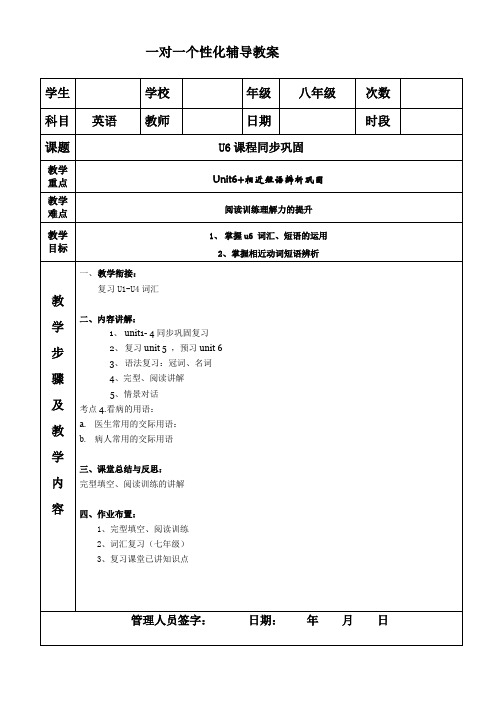
一对一个性化辅导教案一、unit1- 4同步巩固复习二、复习unit 5 ,预习unit 6三、语法复习:冠词、名词四、完型、阅读讲解五、情景对话考点4.看病的用语:一、医生常用的交际用语:1.What’s wrong with you ? What’s the matter ? 你怎么哪?2.How long have you been like this ? 你像这样有多久?3.Have you taken your temperature ? 你量过体温吗?4.Do you sleep very well ? 睡觉好吗?5.What do eat for your meals ? 你三餐吃过什么?6.Have you had anything to eat this morning ? 早晨吃过什么?7.Have you got/ had a headache / cough ? 你头痛/咳嗽吗?8.Maybe you have caught a bit of a cold ? 也许你有点感冒。
9.There is nothing serious . 不严重。
10.You’d better have more/ less food and take some exercise . 你最好多/少吃食物并且参加一些锻炼。
11.Take this medicine and stay in bed for a few days . 吃这个药并卧床休息几天。
12.Take this medicine every four hours and drink more hot water . 每4小时吃一次这个药并多喝开水。
13.Do you smoke ? You’d better stop smoking . 你抽烟吗?最好戒烟。
14.You will get better soon . You will be all right /well soon . 你会很快好起来的。
最新小学英语反义词和同义词近义词教案资料精品课件
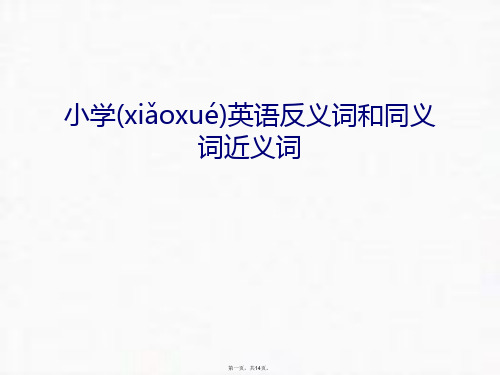
--- out(外面)
large(大的) --第-六页,l共1i4页t。tle(小的)
反义词
left(左)
----- right(右)
quiet(安静的)----- noisy(吵闹的)
quiet(文静(wénjìng)的)-----
active(活跃的)
new(新的) ----- old(旧的)
(14)cool warm (44)old young
(15) wet dry (45)sit stand
(16)dark bright (46)yes no
(17)much little (47)go come
(18)high low (48)different same
(19)always never(49) stop--begin/start
(30)slower
quicker / faster
(60)safe
dangerous
第十一页,共14页。
对应(duìyìng)词
(1) brother
sister
(2) this
that
(3) grandfather
grandmother
(4) man
woman
(5) daughter son
(6) mother
(20 )cheap expensive / dear
(50) like
dislike / hate
第十页,共14页。
(21)new old
(51)weak strong
(22)west east 3)cold hot
(24)win lose (54)good bad
(32)tall short
近义词,同义词专项讲解
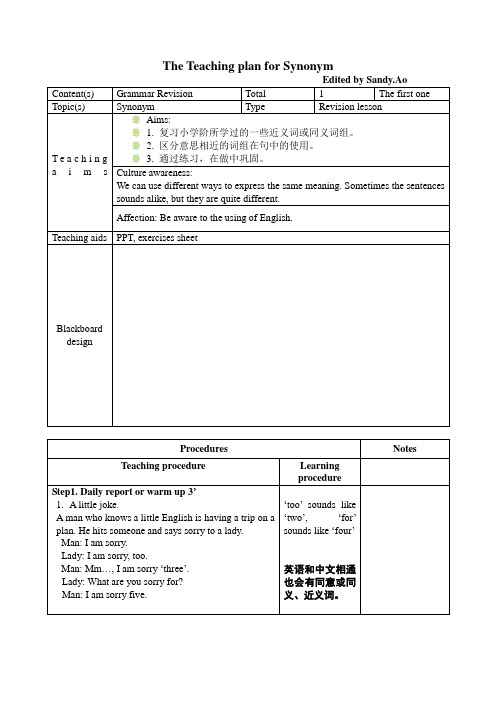
The Teaching plan for Synonym Aims:Culture awareness:Step4. Do some exercises for consolidation.See ex. on PPT and the exercises paper.Appendix: 小学英语同义词away 离开—off 离开/走开(通常与不同的动词搭配)because 因为(因果语气较强,常搭配句子)—for 因为(因果语气较弱,可搭配短语和句子)break 休息/中断(常指短时休息)—rest 休息(相对时间较长)cup 小茶杯—glass 玻璃杯clothes 衣服(总称)—dress 衣服(长裙、某类衣服的总称,如:evening dress, modern dress)dinner 正餐/晚餐—supper 晚餐daddy(儿语)爸爸—dad(口语)爸爸—father(书面语)爸爸evening 傍晚—night 晚上fast 快的—quick 快的great 伟大的/大的—big 大的(常指形状的大小)hello 喂/hi 嗨(相对较为正式)—hey 喂/嘿(相对较为随便)high 高的(通常搭配高山、高楼等)—tall 高的(通常搭配人物、树木等)job 职业/工作(可数名词使用)—work 工作(不可数名词)Mr.先生(搭配姓氏使用)—sir 先生(通常单独使用表称呼)like 喜欢—love 喜爱(喜欢的程度相对较深)little 小—small 小meeting 会议—party 聚会mummy(儿语)妈妈—mum(口语)妈妈—mother(书面语)妈妈ride 骑(马、自行车)—drive 驾驶(车辆)often 经常/常常—usually 通常(频度更高)picture 照片/图片—photo 照片problem 问题/难题—question 问题ship 船/轮船—boat 船/小船too 也(置于句尾)—also 也(置于句中)wear 穿着(较为强调状态)—put on 穿上(强调动作)。
英语近义词辨析教案
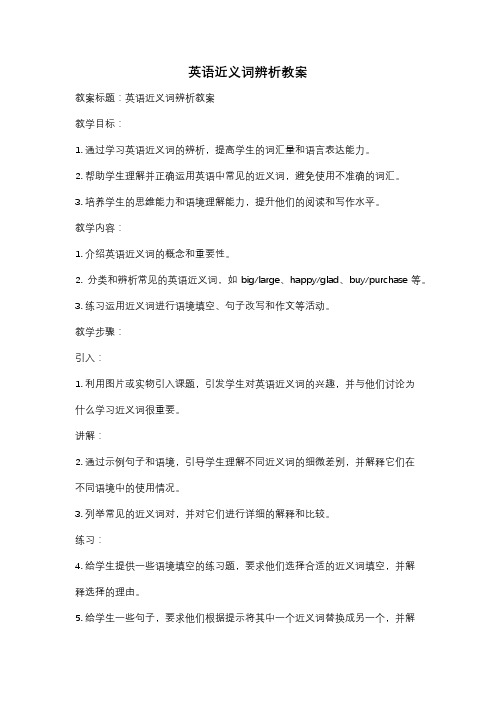
英语近义词辨析教案教案标题:英语近义词辨析教案教学目标:1. 通过学习英语近义词的辨析,提高学生的词汇量和语言表达能力。
2. 帮助学生理解并正确运用英语中常见的近义词,避免使用不准确的词汇。
3. 培养学生的思维能力和语境理解能力,提升他们的阅读和写作水平。
教学内容:1. 介绍英语近义词的概念和重要性。
2. 分类和辨析常见的英语近义词,如big/large、happy/glad、buy/purchase等。
3. 练习运用近义词进行语境填空、句子改写和作文等活动。
教学步骤:引入:1. 利用图片或实物引入课题,引发学生对英语近义词的兴趣,并与他们讨论为什么学习近义词很重要。
讲解:2. 通过示例句子和语境,引导学生理解不同近义词的细微差别,并解释它们在不同语境中的使用情况。
3. 列举常见的近义词对,并对它们进行详细的解释和比较。
练习:4. 给学生提供一些语境填空的练习题,要求他们选择合适的近义词填空,并解释选择的理由。
5. 给学生一些句子,要求他们根据提示将其中一个近义词替换成另一个,并解释替换的原因。
6. 分组让学生合作完成一篇短文,要求他们在文中正确使用近义词,并解释使用的理由。
总结:7. 让学生总结所学的英语近义词,强调它们的细微差别和正确运用的重要性。
8. 鼓励学生在日常学习和写作中积极运用所学的近义词。
拓展:9. 鼓励学生自主学习更多的英语近义词,并分享给同学们,扩大他们的词汇量。
评估:10. 给学生提供一份近义词辨析的小测验,检查他们对所学内容的掌握程度。
教学资源:1. 图片或实物2. 示例句子和语境3. 语境填空练习题4. 句子改写练习题5. 合作完成的短文任务6. 近义词辨析的小测验教学反思:1. 在讲解近义词时,要注意突出它们的细微差别,帮助学生更好地理解和运用。
2. 练习环节要注重培养学生的语境理解能力,让他们能够在实际语境中正确选择和运用近义词。
3. 评估部分可根据学生的实际情况进行调整,可以通过口头回答问题、写作或其他形式进行评估。
常见的英语同义词 新课标 人教版0 教案

常见的英语同义词在学习英语词汇中,有时同义词的辨析是很不容易的,我们一般从三方面进行区分,即:语法、语义和文体。
语法主要是词性、搭配、句式等的区分;语义主要是词义的本义、引申义、比喻义和内涵和外延等的区分;文体主要是正式和非正式、褒义和贬义等的区分。
下面是笔者整理的25组同义词。
1. 路2. 时代3. 战斗4. 牧师5. 服装6. 哭7. 美丽,漂亮8. 拉,拖9. 旋转 10. 生气,气愤 11. 错误 12. 图画 13. 特别的 14. 取消,消灭 15.破碎 16. 环境,形势 17. 著名的 18. 强盗 19.摇动,颤动 20. 说话,谈话 21. 事情,事件 22. 承认 23. 走路 24. 跳 25. 特点,特征1.路way: Wherever there is room for an object to proceed, there is a way.road: A road is a prepared way for traveling with horses or vehicles.path: A way suitable to be traveled only by foot passengers or by animals.route: A route is a line of travel, and may be over many roads.street: A street is in some centre of habitation, as a city town or village, when it passes between houses of dwellings.avenue: A avenue is a long, broad and imposing( 壮严) or principal street.2.时代(期) (时期)period: It indicates any passage of time, great or small. /an extent of time of any length.(时代)time(s): It refers to a period in history. in ancient times/ in Victoria time (新时代)epoch: It indicates a long period of time marked by events or development of a particular kind.The first flight into space marked a new epoch in the history of mankind.(纪元)era: It refers to a very long period of time marked by a particular feature in a great new era of world revolution(时期)age: It shows a particular /a fairly definite period in history. the Bronze Age, Iron Age3.战斗 (打仗)fight: It is a bodily struggle (奋斗斗争)struggle: An effort of any kind to overcome difficulty.(战斗) battle: A fight between armed forces.(战役) campaign: A series of related military operations in a war.(战争) war: A period of fight between countries or states whenweapons are used and many people are killed.(对抗) combat: A fight, conflict, controversy.4.牧师 (教士牧师)priest: A person, esp. a man specially trained for various religious duties and ceremonies, in the Christian church, esp. in the Roman Catholic church(牧师) minister: A member of clergy, esp. Protestant churches.(牧师) clergy(pl): The officially appointed leader of the religious activities of a particular church or temple.clergyman: clergymen(pl) a member of clergy.(牧师) pastor: A Christian religious leader in charge of a church and its members, esp. in a Protestant church.(教区牧师) vicar: A priest in charge of an area(parish) in the church of England.father: A little of respect for a priest, esp. in the Roman Catholic.5.服装clothing(collect): (fml) General term of clothes.clothes(no single): Coverings of the body such as coats,dresses, suits, shoes, hats.garment(fl): A suit of clothes used by actors./a single article of clothing.costume: 1) The fashion of dress peculiar to a people, nation, class, period, etc.2) A dress worn by actors in a play. uniform: worn by all members of the community.dress: 1) A kind of outer garment worn by women (连衣裙).2) worn on special occasions (礼服) evening dress/ morning dresssuit: A set of outer clothes to be worn together. evening suit/swimming suitcoat: A garment with sleeves worn on top of other clothes from rain, heat, etc.overcoat: A warn coat worn in the street.6.哭cry: The most general one.(哭泣) weep: To let flow tears.(抽泣抽嗒) sob: To weep or sigh with short quick breaths.(哭天抹泪涕泪交流) snivel: To sniffle and cry in a irritating manner.(哭嚎又哭又闹) blubber: To cry loudly noisily.(发出低声报怨声) whine: To make a low complaining cry.(嚎哭) bawl: To utter loud cries (always in bad sense).(痛哭) wail: To cry aloud from pain or sorrow.(呻吟) moan: To make a low, miserable sound in pain or sorrow.(呻吟) grown: To make a low sound of pain, unhappiness or disapproval(哀悼) mourn: To feel or show sadness or sorrow for someone who has died.(哀悼) lament: To express great sorrow or regret.7.美丽漂亮good-looking: Having an attractive appearance in a strong, healthy way used for men and women not things.beautiful: ( a woman or a thing) Suggesting symmetry of features or perfection of proportion, elegance and mobility. beautiful flowers, a beautiful girl/voice/city/face beautiful weather.handsome: Of attractive appearance applies to men. a handsomefellow/actor/horse/buildings/young man.pretty: (a girl, or a small thing) Suggesting liveliness and sweetness, pleasing or nice to look at. a pretty little woman/garden, a pretty girl/ picture/piece of music,lovely: (something) So beautiful that it makes you feel good to look at it or even to think about it. The garden looks lovely.fair: Beautiful( of woman in poet) light in color esp., skin hair.gorgeous: (persons or things) (inf) Extremely beautiful or handsome.8.拉拖pull: The most general one.draw: It implies a smoother, steadier motion and generally a lighter force than pull.drag: It usually refers to horizontal motion or motion up an incline (slope) and it suggests laborious efforts over rough ground or against friction, resistance or gravity.The escaped prisoner was dragged out of his hiding place.haul: It implies continuous pulling or dragging of heavy or bulky objects.The fisherman is hauling a net.tug: It applies to hard often sudden violent effort to pull.He tugged at my sleeve to ask directions.jerk: To pull suddenly.He jerked out the knife that was stuck in the wound.tow: To pull by a rope or chain. We towed the car to the nearest garage.wrench: To pull hard with a twisting or turning movement.9.旋转turn: The most general one.(自转) spin: To turn quickly around a central point.It emphasizes the continuity of the action, and usually the narrow extent of the circular motion.The wheel is spinning on its axis.(急转) whirl: To round very fast.It implies the lock of conscious control.The leaves whirl in the wind in the yard.(转动) rotate: To turn round a fixed point with a circular movement.The earth rotates once every 24 hours.(绕转) revolve: To turn or move in a circle around a central point.It indicates circular or elliptical (椭圆) movement.The planets revolve around the sun.10.生气气愤anger: The most general one.(易怒) be cross: Feeling easy to get angry.(愤慨) indignation: (fml) Anger.It stresses righteous anger at what one considers unfair, mean or shameful.We expressed our indignation at the ruthless exploitation.(愤怒) wrath: Very treat anger. (literary)It suggests a desire on intent to revenge or punish.(狂怒) rage: Wild, violent anger.It suggests loss of self- control from violence of emotion. in a rage /to fall into a rage.(暴怒) fury: Violent, extreme and destructive anger.She flew into a fury.11.错误(误会) mistake: A wrong thought, act. It implies carelessness Anyone can make a mistake.(过错弱点) fault: A bad point, but not of a serious moral kind. It refers to behavior and character. His only fault is that he lacks ambition.find fault with sb / at fault shortcoming: Weakness, failingIt refers to failures or deficiencies in things as well as people.In spite of all her shortcomings I still think she's one of the best teachers in the school.(疏忽) error: A mistake (formal sometimes literary)It implies deviation from a standard or modelThe accident was caused by human error.(缺点毛病) defect: sth lacking or imperfect.It refers to quality.The radio was returned because of a defect.(失误过失) blunder: A very stupid or unnecessary mistake.It implies ignorance.This is the fatal blunder of his life.12.图画picture: The most general one.(彩图) painting: pictures with color.(绘画图画) drawing: A picture made with a pen, pencil and crayon. Sketch, diagrams and graphs are all drawings.(草图) sketch: A rough not detailed drawing.(图解图表) diagram: A drawing, figure that shows the arrangement of something.(曲线图) graph: A diagram in which a straight line, curved, or zigzag line shows how two sets of numbers or measurements are related.(插图) illustration: A picture to go with words of a book.(图样草图) draft: The first rough written form of anything.(平面图) plan: A line drawing of a building as it might been seen from above.(主视图) elevation: A flat upright side of a building.(海图) chart: A map esp. a detailed map of a sea area.13.特别(专门的,与众不同的) special: Different in some way from what is common, ordinary, or usual.It stresses having a quality, character, identity, or use of its own.The tube contains special gases.(特别的) especial: (fml) To an usually great degree, exceptionalIt emphasizes the importance of the things or the persons mentionedThis is a matter of especial importance.(各别的) particular: Relating or belonging to only one thing or person.It stresses the distinctness of something as an individual which is worth notice. In that particular case, the rule doesn't hold.(适用)(特种的) specific: Detailed and exact, clear in meaning and explanation, fixed, determined.(used in scientific articles)It implies a quality or character distinguishing a kind or a species.He gave me a very specific instruction. There is a specific tool for each job.(独特的) peculiar: Strange or perhaps unpleasant.It implies strangeness. He has a peculiar way of speaking.14.取消消灭(取消解除) cancel: To give up, to declare something is to be effective.He has cancelled his leave of absence.(消假)(废除废止) abolish: To do away with. It refers to practices, social institutions. Bad customs should be abolished.(消灭排除) eliminate: To get rid of.We should eliminate the false and retain the true.(撤消废除) repeal: To bring to an end of the effect of a law or an order. Some laws should be repealed.(根除消灭) exterminate: To destroy completely and wholly.Colonialism must be exterminated.15.破碎break: The most general one.(压碎压破) crush: To press together violently as to break, to destroy its shape by squeezing it. It suggests the effect of great external pressure.The tree fell on top of the car and crushed it.(打碎) smash: To break thoroughly to pieces with a crushing sound.She dropped the plate and smashed it.(打裂) crack: To break without separation of parts.It suggests the breaking out across a surface.He cracked the window by leaning against it.(破裂) burst: To break open by pressure from within.The fireworks burst while they were in the air.(砸碎破碎) shatter: To break into pieces.It suggests the breaking up of a thin surface.The glass was shattered to pieces.(撞坏) crash: To refer to the vehicle which hits something and is badly damaged.16.环境形势(环境形势) conditions: The location and other factors likely toaffect it. It suggests something that has stayed the same forsome time and which affects daily life such as food, work, and houses.We are now studying the economic conditions in the developing countries.(形势) situation: A position or state at a particular time, set of conditions, facts, and events having an effect on a person, society, etc.It suggests more general matters such as government planning and finance.The political situation in these countries are always changing.(环境周围外界) environment: The circumstances, things and conditions that influence you. It refers to spirit aspect, physical aspect andmaterial aspect. We must try to beautify our environment.(形势情况) circumstance(s): A situation or event around us, a certain kind of atmosphere, the conditions that affectwhat happens. in (under) the circumstances(环境周围事物) surrounding(s): The area and environment around a place orperson. It indicates a very narrow condition, "physically" sometimes reflects spiritual aspect.They lived in hostile surroundings.17.著名的well-known: (infl)famous: The most general one. widely known or honored.(杰出的知名的) distinguished: Great, outstanding marked by excellent quality or deserved fame, used especially of people who are famous for serious work in science, the arts etc.He was a distinguished writer.(驰名的) celebrated: Famous, (substitute for renowned)It refers objectively to sb or something that has been give acclaim or honoured with awards or prizes. She was a celebrated actress.renowned: Highly honored and famous for something good. often refers to places or things,also It suggests something that has become legendary or is no longer available for an objective evaluation.Edison was renowned for his inventions.noted: Well-known and admiredIt often describes a more intellectual kind of effort and accomplishment indicating an authority or expert or their theories. Maybe it is not widelyknown to the general public. He was a very noted expert.(臭名昭著) notorious: Famous for something bad.He is notorious for his crimes.18.强盗thief: The most general one.(强盗) robber: It suggests a direct confrontation in which the owner is forced to give up his valuables.(行凶强劫) mugger: A person who attacks and robs people in a street or in a lift.burglar: A person who breaks into a house at night to steal something.(歹徒暴徒) gangster: A member of a group of criminals, esp. those who arearmed and use guns to threaten.(匪徒) bandit: an armed robber.It suggests an organized group in a rural setting.(土匪) brigand: A robber who lives by robbing travelers in the country.(海盗) pirate: A person who robs on the sea.19.摇动,颤动shake: The most general one. to move up and down or back and forth.It refers to persons or things.(发抖) quiver: To tremble a little.It suggests a rapid but invisible vibration.His lips quivered with emotion.(颤抖) tremble: To shake uncontrollably and slightly as from fear, cold, excitement etc.It implies uneasiness and nervousness.Her voice trembled as she began to sing.(瞬间发抖) shiver: To tremble from fear or cold.It suggests a slight and rapid movement.He stood shivering in the snow.(极度颤动) quake: to shake or tremble violently.It suggests a more violent and sudden change.He quaked with excitement.An explosion cam make the ground quake.(抽筋般颤动) shudder: To shake uncontrollably for a movement.It suggests a more intense shaking.She shuddered at the sight of a snake.20.说话谈话(说话)speak: To use your voice to say words.(说) say: To speak words.(发出声音) utter: To make sound and say words.drawl: To speak in a slow, prolonged manner.mutter: To express displeasure with compressed lips.rave: To talk in an angry, uncontrolled way.gabble: To talk rapidly, making inarticulate sounds.(谈论) remark: To mention it or comment on it.(陈述) state: To say, express or put into words, esp. formally.He stated his view.(讲述) narrate: To tell formally in writing or speech or describe something in order with intonation.He narrated his adventure in the forest.(详述) relate: To tell formally in details, to give an account of.He related his experiences.(讲演) address: To say in speech or writing to a person or group.tell: To let people know about something.talk: To say things to someone.converse: To talk formally.The scholars are conversing with each other onlinguistics.chat: To talk in a friendly, familiar, informal manner.The two friends sat in a corner and chatted.chatter: To talk continuously rapidly about small things.The schoolgirls went along chattering.whisper: To talk in a low voice.She whispered me not to talk so loudly.murmur: To make a soft sound, esp. to speak or say in a quiet voice.He often murmurs to himself.(闲谈) gossip: To talk about the details of other people's actionsand private lives which may not correct or proper.That woman is very fond of gossiping about others.stammer: To speak with pauses and repeated sounds because of excitement, embarrassment.stutter: To speak with pauses and repeated sounds because ofinherent speech defect.21.事情,事件(事) thing: An event, a fact, a subject.He talked of many interesting things.(事情) matter: Seth that you have to deal with, something to be discussed, thought over.There are several matters to be dealt with at the meeting.(事务责任) business: A special duty, something that has to be done.Public business is every one's business.(事务) affair: An event or set of connected events. (pl) private and personal life.I have many affairs to look after.(事件) event: An important happening. Events such as birthdays and anniversaries are often celebrated.Do you know the chief events of 1986.incident: Not as important as an event. Incidents seldom are celebrated. Sometimes an event becomes an incident after many years have passed.(偶然事件) happening: An occurrence, and sometimes an unusual one.There have been strange happenings here lately.(偶发事件) occurrence: An incident that is usually unexpected and has not been planned ahead of time.Flood is practically an annual occurrence in this district.22.承认admit: To agree to the truth of, usu, something bad.It suggests reluctance or possible objection.He admitted his crime/stealing.(自白供认) confess: To admit guilt as to a crime or as to a shortcoming, in the sense of making known to others one's own error or wrong doing.He confessed his fault/doing something wrong.acknowledge: to agree the truth of, recognize the fact or existence of what have said or done, good or bad.It emphasizes openly in a embarrassing or awkward and usually not voluntary way.I acknowledged my signature/mistakes/errors/having been defeated.grant: To admit or to agree something is true.I granted his request/his honesty.take sth/sb for granted.concede: To admit as true, just or proper often unwillingly because of overwhelming evidence.I conceded you that point, but I still think you are wrong.recognize: To accept or acknowledge it.It refers to something about law and diplomacy.The new regime was recognized by China.23.走路walk: The most general one.stride: To walk with long steps.He strode through the station a few minutes before the train left.(高视阔步) stalk: To walk stiffly, slowly, and proudly with long steps.trot: To jog, move quickly, usu refers to horses.(蹒跚而行) waddle: To walk from side to side with short steps like a duck.The fat man waddled out of the room.(蹒跚) stagger: To walk unsteadily, slide and drag the feet almostfalling at each step, usually because of illness, injury or drink.After drinking too much, he staggered in the street.(摇摆蹒跚) totter: To walk unsteadily showing great weakness often usedof very young children learning to walk. The child tottered before his parents.(拖着脚走) shuffle: To move without lifting the feet clear of the floor as if wearing slippers.The old man shuffled along the road.(趾高气扬地走) strut To walk in a proud strong way, esp. with the chest out and trying to look important.(慢行) amble: To walk at an easy gentle rate.It stresses a leisurely but regular movement.(闲逛) stroll: To walk, esp. slowly, for pleasure.It emphasizes a slower movement, more wandering and aimless with suggestions of many starts and pauses.They are strolling through this park.saunter: A little more formal than stroll.(漫步徘徊) wander: To move about without a fixed course, aim, or purpose.He was wandering about/down/through/up and down the street.(漫游) roam: To wander with as very clear aim.It suggests a more serious purpose behind the irregularof circular movement in complete forgetfulness of time.The lovers roamed around/through the fields.(跋涉) trudge: To walk heavily and wearily with effort as when one (plod) is tired.The hunter was trudging through the deep snow.(重步行走) tramp: To walk with firm heavy steps.Who has been tramping all over the carpet in muddy shoes.(扭扭捏捏地走)mince: To walk with little short steps in an affected manner.It was a funny sight to see her mince along.slouch: To walk in a loose, ungainly (不雅观) way.hustle: To walk in a busy, active way.24.跳jump: The most general one. to throw oneself into the air.(跳起)leap: (literary) To spring through the air, often landing in a different place.The boy leaped over the brook without difficulty.(跳跃) spring: To leap suddenly and quickly.He sprang to his feet at the sudden noise.(跳着跑) bound: To spring lightly along.It suggests high spirits and excitement.His dog bounded to meet me.(轻快地跑) skip: To move in a slight dancing way, as with quick steps and jumps.The little girl skipped at her mother's side.hop: To jump on one leg.The boy had hurt his leg and had to hop along.vault: To leap over something using the hands or a pole.You can vault a fence by putting your hands on it and swinging yourself over.hurdle: To jump over some thing while running.The horse hurdled the fence and ran into the woods.25.特点特征quality: The most general one.(特点)characteristic: Quality typical of a particular person and thing, a special and easily recognized quality of sb/sth.It has may scientific or technical uses.It implies neutral description in referring to any aspect of something without evaluating its relative importance to the whole.A useful characteristic of the cat is its ability to catch and kill mice.(特征) character: The combination of qualities which make a particular person, thing, place, etc.A tendency not to show emotions is supposed to be part of the British national character.(性质) nature: The qualities make someone or something different from others.It indicates the widest range of traits, including emotional, mental and physical qualities.It is only human nature to like money.(特征) attribute: A quality belonging to or forming part of themature of a person or thing.The word is positive rather than negative.Darkness is an attribute of night.(特性) peculiarity: The quality of being peculiar, strangeness, unusualness.It shows an unpleasant attribute that is quite noticeable.One of his peculiarities is that his two eyes are not the same size.(特色) feature: A typical and noticeable part or quality.It suggests something positive and specificallyIt refers to physical appearance.A lake is an important feature in this area.(品质特性) trait: A particular quality of sb/sth.It refers to more abstract attributes. Honesty and diligence are the chief traits of his character.(个性) personality: The whole nature or character of a particular person.It refers to the whole indefinable emotional coloration that a specific person gives off. He has a strong personality.。
- 1、下载文档前请自行甄别文档内容的完整性,平台不提供额外的编辑、内容补充、找答案等附加服务。
- 2、"仅部分预览"的文档,不可在线预览部分如存在完整性等问题,可反馈申请退款(可完整预览的文档不适用该条件!)。
- 3、如文档侵犯您的权益,请联系客服反馈,我们会尽快为您处理(人工客服工作时间:9:00-18:30)。
同义近义词短语速记1. 到达reach; get to; arrive in(at)2. 回来come back; get back; return3. 害怕be afraid of; be(feel) frightened of4. 担心be worried about; be anxious about5. 讨厌be tired of; be fed up with6. 因……而出名be famous for; be well-know for7. 在……方面好be good at; do well in8. 在……方面差be weak in; do badly in9. 能be able to; can10. 值be worth; cost11. 出生be born; give birth to12. 当心;小心be careful; look out13. 离开be away; leave14. 在家be in; be at home15. 在外面;不在家be out; be not at home16. 装满了be full of; 被用……装满be filled with17. 来自be from; come from18. 一直all the time; always19. 遍及all over; around20. 终年;全年all the year round; during the whole year21. 尽快as soon as possible; as early as possible22. 立刻;马上at once; right away23. 起先(初)at first; first of all; at the beginning24. 最后at last; in the end; finally25. 一次又一次地again and again; over and over26. 一整天all day; in the daytime27. 有时at times; sometimes28. 不再no longer; not...any more29. 不久后before long; soon30. 及时in time; at the right time31. 不超过no more than; 少于less than32. 多于;超过more than; over33. 差不多more or less; about34. 刚才 a moment ago; just now35. 就在那时at that time; just then36. 今后in the future; from now on37. 有一天one day; some day38. 到目前为止so far; up to now39. 在过去十年间in the last ten years; since ten years ago40. 一点 a little; a bit(of)41. 几个;一些 a few; several42. 玩得开心enjoy oneself; have a good time; have fun43. 独自,孤单by oneself; alone44. 事物food; somethng to eat45. ……怎么样what about; how about46. 名字first name; given name47. 姓family name; last name48. 展览on show; on display49. 在……的中部in the center of; in the middle of50. 紧邻着next to; beside51. 多亏thanks to; because of52. 在某人帮助下thanks to; with one’s help53. 照料look after; take care of54. 查找look up; try to find the meaning of55. 看起来像……一样look like; look the same as56. 与……相像look like; be similar to; take after57. 看电影see a film; watch movies; go to the cinema; go to the movies/a movie58. 告别see sb. off; say goodbye to sb.59. 打电话给……ring up; call up60. 给某人打电话give sb. a call; make a call to sb.61. 坐下take a seat; sit down62. 做运动do sports; play sports; take sports63. 别挂断hold on; wait for a moment; just a minute64. 帮助help sb.; give sb. a hand65. 举手hands up; put up one’s hand66. 分散;发放hand out; give out67. 继续做某事continue + v-ing; go on + v-ing; carry on + v-ing68. 起床get up; be up69. 下来get down; come down70. 入睡get to sleep; fall asleep71. 迷路get lost; can’t find the way72. 派人去请send for; ask sb. to come73. 休息一会儿have a rest; have a break74. 举行野炊have a picnic; go on a picnic75. 游泳have a swim; go swimming76. 吃早餐have breakfast; have a morning meal77. 不得不have to; must78. 去购物go shopping; do some shopping; go to buy sth.; go to a shop79. 复习go over; review80. 快点come on; hurry up81. 想出come up with; think up82. 匆忙离开hurry off; go away quickly; run off83. 匆忙地in a hurry; quickly84. 处理do with; deal with85. 放弃give up; stop doing sth.86. 由……构成be made up of; consist of87. 诸如;例如such as; for example; for instance88. 去睡觉go to bed; go to sleep89. 不久前the other day; not long ago90. 穿着wear; be in; be/get dressed in91. 几乎不hardly; almost not92. 不经常hardly ever; seldom93. 许多plently of; a lot of; lots of; a number of; many much94. 宁可……而不prefer to...rather than; would rather...than...95. 取得进展get on with sth.; make progress with96. 属于belong to; be owned by97. 耗尽,用完use up; run out of98. 发生happen; take place99. 追逐chase; run after100. 对……满意be happy with; be pleased with101. 使某人记起remind sb. of; make sb. remember102. 同意某人agree with sb.; have the same opinion as sb. 103. 把……提供给某人provide sth. for sb.; offer sth. to sb. 104. 被期望做某事be supposed to do sth.; should do sth. 105. 别着急take it easy; no hurry106. 使高兴起来cheer up; make sb. happier107. 给某人提供某物give sb. sth.; provide sb. with sth.108. 相信;信任believe in; trust109. 想要would like; want; ask for; feel like110. 解决solve; work out111. 一百年 a century; one hundred years112. 回信reply to a letter; answer a letter113. 让某人搭便车give sb. a ride; pick up sb.114. 使某人相信某事convince sb. of sth.; make sb. believe sth. 115. 跟……谈话talk to/with; speak to116. 访问;拜访drop in; visit117. 与……不相同be different from; be not the same as; be unlike 118. 对……印象好be different from; be not the same as; be unlike 119. 在就餐at table; be having meals120. 到……去leave for; go off to121. 生……的气be angry with; be annoyed with; be mad at 122. 出现appear; show up123. 在国外abroad; in another country124. 整理床铺make the bed; tidy the bed125. 关闭;关掉shut down; turn off126. 出发;动身set out; set off; start127. 穿衣服get dressed; put on128. 在……上花费spend...on...; pay...for...129. 以……为生live on; feed on130. 自学learn...by oneself; teach oneself131. 失去生命lose one’s life; die132. 败给某人lose to sb.; be beaten by sb.133. 开某人玩笑play a joke on sb.; make fun of sb.134. 比……更喜欢……prefer...to...; like...better than...135. 把……看作regard... as; treat...as136. 意外by accident; by chance137. 建立;设立set up; establish; start; found138. 当然of course; certainly; sure139. 修理mend; repair; fix up140. 没关系Never mind; No problem; It doesn’t matter; Don’t mention it 141. 关于about; on142. 活着的living; alive143. 惊奇的amazed; surprised144. 漂亮的beautiful; pretty145. 开始begin; start146. 聪明的clever; bright147. 关闭close; shut148. 完成finish; complete149. 功课class; lesson150. 困难的hard; difficult151. 加入join; take part in152. 有名的famous; well-known153. 饲养feed; keep154. 比赛game; match155. 高兴的happy; pleased; glad156. 巨大的huge; enormous; large; very big157. 主意;观点idea; mind158. 是否if; whether159. 病的ill; sick160. 活泼的lively; lovely161. 制造;生产make; produce162. 也许maybe; perhaps163. 照片photo; picture164. 阻止stop; prevent165. 难过的sad; unhappy166. 二手的second-hand; used167. 特别的special; unusual168. 方法way; method169. 愚蠢的silly; foolish170. 拥有own; have171. 相当rather; pretty172. 分离;分开divide; separate173. 垃圾garbage; litter174. 担心的anxious; worried175. 落下drop; fall176. 愉快的pleasant; enjoyable 177. 发现find; discover178. 成年人grown-up; adult 179. 粗鲁的rude; impolite 180. 主要的mainly; mostly反义词速记1. after—before2. bring—take3. close—open4. closed—open5. youn—old6. new—old7. ahead—behind8. cloudy—sunny9. like—dislike10. cock—hen11. animal—plant12. cold—hot13. ask—answer14. come—go15. aunt—uncle16. cool—warm17. back—front18. cry—laugh19. bad—good20. danger—safety21. dangerous—safe22. friendly—unfriendly23. begin—end24. white—black25. curly—straight26. lazy—hard27. short—long28. short—tall29. daughter—son30. behind—in front of31. day—night32. clean—dirty33. best—worst34 dead—living35. better—worse36. death—birth37. big—small38. different—same39. black—white40. difficult—easy41. hard—easy42. heavy—light43. interesting—boring44. borrow—return45. dry—wet46. both—neither47. early—late48. bottom—top49. empty—full50. boy—girl51. enemy—friend52. busy—free53. ever—never54. buy—sell55. fair—unfair56. cheap—expensive57. fat—thin58. clever—foolish59. first—last60. forget—remember61. happy—sad62. beautiful—ugly63. police—rude64. grandma—grandpa65. polite—rude66. happy—sad67. poor—rich68. hate—love69. possible—impossible70. pull—push71. quick—show72. high—low73. receive—send74. hungry—full75. refuse—accept76. husband—wife77. rest—work78. in—out79. right—wrong80. into—outof81. rise—drop82. key—lock83. save—waste84. king—queen85. short—tall86. later—sooner87. sit—stand88. sky—ground89. lose—find90. soft—hard91. man—woman92. south—north93. many—few94. start—finish95. stay—leave96. more—less97. strong—weak98. morning—evening99. teacher—student 100. mother—father 101. teach—learn 102. yes—no。
